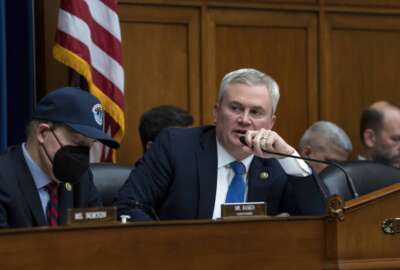
What to expect from the new IT/cyber/innovation House subcommittee
Federal experts praised Rep. Nancy Mace (R-S.C.) for past legislative bipartisan efforts around quantum computing and federal cyber workforce.
Throughout the federal technology community, there were tiny celebrations and the undercurrent of a sense of dread with the reconstitution of the House Oversight and Accountability Subcommittee on federal IT, cybersecurity and government innovation.
The dichotomy of these feelings wasn’t just limited to one specific group. Agency chief information officers and their staffs, contractors and long-time federal observers felt the push/pull of what’s to come.
The celebration:
“From a committee structure standpoint, in many ways the new structure goes back to a proven model that we had when I was on the committee staff in the early 2000s and that more recently proved effective the last time Republicans held the majority with IT separate from more traditional government operations,” said Mike Hettinger, a former House Oversight and Reform Committee staff member and now president of Hettinger Strategy Group. “Given the criticality of the IT modernization and cybersecurity issues currently facing the federal government, from systems modernizations and customer experience to ransomware and zero trust, this targeted focus is the right structure at the right time to make sure they are being addressed.”
The sense of dread:
As my colleague Drew Friedman wrote last week, the House Oversight and Accountability Committee made clear it’s primed and ready to turn up the oversight heat. This mindset surely will trickle down to the subcommittee level.
“If you think about a shift from reform to accountability, that suggests a more adversarial posture. It is going to be less about finding legislative solutions to a particular issue, and more about bringing accountability to people who have potentially done something that Congress thinks is wrong,” said Andy Wright, former staff director and counsel for the committee’s National Security and Foreign Affairs Subcommittee from 2007 to 2011 and now a partner at K&L Gates. “It portrays a deeper change in the posture between the executive branch and the new Congress.”
Taking a closer look at the new chairwoman of the subcommittee, Rep. Nancy Mace (R-S.C.), there aren’t a lot of past signals to pull from.

As Julie Dunne, the former staff director and senior counsel for the Oversight committee’s Government Operations Subcommittee from 2017 to 2019, pointed out one example of Mace’s past performance is she co-sponsored with Rep. Ro Khanna (D-Calif.) the newly enacted law Quantum Computing Cybersecurity Preparedness Act.
Another former Hill staff member, who requested anonymity because they didn’t get permission to speak to the press, highlighted Mace’s support and the passage of the Federal Rotational Cyber Workforce Program Act in May 2022 as another example of her bi-partisan and technology focused previous work.
Rep. Gerry Connolly (D-Va.) took over as ranking member of the subcommittee after serving as the chairman of the government operations subcommittee for the last two years where federal IT, cyber and similar issues were folded in back in 2020. Some observers expressed surprise that Connolly took the ranking member role with the federal IT and cyber subcommittee instead of the government operations and federal workforce.
“It’s also great to see Rep. Connolly appointed to the subcommittee as ranking member. As we all know, there’s no one in Congress that’s done more to support the federal IT community than Rep. Connolly and I look forward to his ongoing leadership on federal IT and cybersecurity issues,” Hettinger said.
Going through Mace’s bills she sponsored or was an original co-sponsor of during the last Congress offers a bit more insight into some of her interests. Some of these include:
- Veterans’ Cyber Risk Awareness Act — VA should run a communications and outreach campaign to educate veterans about cyber risks. These risks can include disinformation, identity theft, scams and fraud spread via the internet or social media.
- Whistleblower Protection Improvement Act of 2021 — The bill would have established, modified and expanded certain whistleblower protections for federal employees, including with respect to petitions to Congress, whistleblower identity, and protected disclosures.
- All Economic Regulations are Transparent (ALERT) Act of 2021 — Each agency must submit a monthly report to the Office of Information and Regulatory Affairs (OIRA) for each rule the agency expects to propose or finalize during the following year, including information about the objectives and legal basis for the rule as well as whether the rule is subject to periodic review based on its significant economic impact.
Now at the same time, she also signed on to bills that many believe are anti-federal worker or at least considered questionable support for federal employees such as one to create Schedule F in law, one to require the Office of Personnel Management to report how much official time federal employees are using and one for what purposes and legislation to prohibit agencies from requiring federal contractors to receive the COVID-19 vaccine.
So what does this all mean for federal IT, cybersecurity and government innovation?
Mace offered a little insight in her press release announcing her new chairwomanship, “Securing our nation’s data, protecting our cyber infrastructure, and studying emerging technologies of the future like artificial intelligence, quantum computing, and blockchain integration is more important today than ever.”
Dunne, now a principal at Monument Advocacy, said the fact that Rep. James Comer (R-Ky.), chairman of the full committee, brought back the subcommittee reflects the importance of these issues.
“The portfolio for this new subcommittee is broad and incredibly important given the importance of addressing cybersecurity risk and the critical need to innovate and promote IT modernization across the federal government,” she said. “I think she and Ranking Member Connolly will work well together on these important issues.”
The former Hill staff member said Mace’s history of working across party lines is an important sign for the future of the subcommittee.
“Connolly’s interest and focus on data centers and the cloud is well known. Mace has demonstrated the ability to work across party lines to address current and future challenges federal agencies face. Legislation such as the Federal Cyber Workforce Act and the Quantum Computing Cybersecurity Preparedness Act shows that she is forward looking and serious about problem solving,” the former staff member said.
And as we’ve seen over the past few years, the subcommittee has plenty of fertile ground to begin to plow to plan seeds of change.
There are several questions that the federal IT community will follow around the future of the Federal IT Acquisition Reform Act (FITARA) scorecard, whether the modernization of the Federal Information Security Management Act (FISMA) can finally get across the finish line and whether the number of federal executives with the title of CIO will reemerge as an issue for the subcommittee.
The other big question is how Mace and Connolly will work together. Typically, the subcommittee chairman and ranking member have had a close relationship on these types of issues as federal IT and cybersecurity are mostly non-partisan. Connolly and Rep. Will Hurd (R-Texas) and Rep. Darrell Issa (R-Calif.) worked together closely of several important federal technology laws, including FITARA and the Modernizing Government Technology Act.
Mace’s history suggests she will be similarly bipartisan on these issues, and that’s a good sign as the subcommittee gets off the ground.
Copyright © 2025 Federal News Network. All rights reserved. This website is not intended for users located within the European Economic Area.
Jason Miller is executive editor of Federal News Network and directs news coverage on the people, policy and programs of the federal government.
Follow @jmillerWFED





